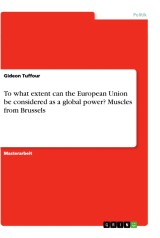Details

To what extent can the European Union be considered as a global power? Muscles from Brussels
1. Auflage
|
36,99 € |
|
| Verlag: | Grin Verlag |
| Format: | |
| Veröffentl.: | 21.04.2021 |
| ISBN/EAN: | 9783346392022 |
| Sprache: | deutsch |
| Anzahl Seiten: | 98 |
Dieses eBook erhalten Sie ohne Kopierschutz.
Beschreibungen
Masterarbeit aus dem Jahr 2021 im Fachbereich Politik - Thema: Europäische Union, Europa-Universität Flensburg (ehem. Universität Flensburg), Sprache: Deutsch, Abstract: The work identified types of powers and the kinds that the EU utilizes in its international relations. Thought-provoking information was unearthed from the EU's trade deals with several states worldwide, the EU's humanitarian/developmental aid, and its global advocacy and leadership in global environmental sustainability. Compared to the USA, the EU was the current global power; the partnership, differences, and challenges between the EU-USA relationship in the international space were then identified and explained. The general analysis of the information and data gathered was then discussed.
The European Union was formed after 1957 during Rome's Treaty with only six European heads of state. The EU has now grown with twenty-seven States, thereby making the EU sui generis. Some analysts and scholars term the EU as a super-state, and others term the EU as worthy of being a global power. This work will analyze the features and actions of the EU and will find out if the EU can be considered as a global power in these modern times. Using Realism, Liberalism, and Socio constructivism as the theoretical framework.
The study employs a mixed-method design; more qualitative data was used than quantitative data. The sources of data for both qualitative and quantitative design for the work were retrieved from the websites of the Organization for Economic and Development (OECD), the European Union, the European Commission, and the European Council. Secondary sources include newspapers, online journals, online newsfeeds, journal articles, academic books, essays, and textbooks. All these sources helped in answering the research question and drawing a definite conclusion for the work.
The European Union was formed after 1957 during Rome's Treaty with only six European heads of state. The EU has now grown with twenty-seven States, thereby making the EU sui generis. Some analysts and scholars term the EU as a super-state, and others term the EU as worthy of being a global power. This work will analyze the features and actions of the EU and will find out if the EU can be considered as a global power in these modern times. Using Realism, Liberalism, and Socio constructivism as the theoretical framework.
The study employs a mixed-method design; more qualitative data was used than quantitative data. The sources of data for both qualitative and quantitative design for the work were retrieved from the websites of the Organization for Economic and Development (OECD), the European Union, the European Commission, and the European Council. Secondary sources include newspapers, online journals, online newsfeeds, journal articles, academic books, essays, and textbooks. All these sources helped in answering the research question and drawing a definite conclusion for the work.
Diese Produkte könnten Sie auch interessieren:

Inclusión educativa de niños, niñas y adolescentes migrantes venezolanos, en Colombia

von: Douglas Jiménez

15,99 €
















